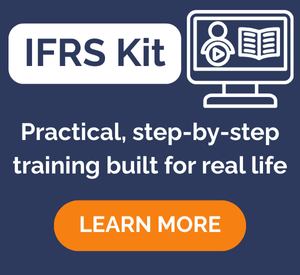How to Account for Cryptocurrencies in line with IFRS
Cryptocurrencies + their accounting under IFRS explained very clearly. Video included!
Example: Expected Credit Loss on Interest-free On-demand Loan
Let’s face the truth: most intercompany loans (or at least many of them) are special in some way: They are undocumented – a parent simply sends cash to a subsidiary with no contract whatsoever and no one has an idea what the terms of the…
IFRS 9: An Auditor’s Perspective
The end of 2018 spelled out relief for most accounting and financial modelling experts responsible for the implementation of IFRS 9: all necessary changes to accounting policies, models and methodologies were designed and enforced, all in time for a lovely Christmas break at the end…
IFRS 2019 Update: Major changes you should be aware of
Here we go again – another year has started and a number of changes or amendments of IFRS came into effect. I am pretty sure that you are aware of the biggest ones like new IFRS 16, but let me sum up all the new…
How to Present Financial Instruments under IAS 32
There are three IFRS covering the area of the most complex IFRS topic – financial instruments: IAS 32 Presentation of Financial Statements – this standard contains basic definitions and rules for presenting of financial instruments; IFRS 7 Financial Instruments: Disclosures – here, you can find…
How to account for intercompany loans under IFRS
How to account for intercompany loans under IFRS when there is no documentation, loans are not at commercial terms or there is no fixed repayment date? Learn here!
What to disclose under IFRS 7 Financial Instruments: Disclosures
About 3 years ago, I was reviewing the financial statements of a medium-sized company providing consumer loans. They needed the IFRS financial statements due to lots of loans taken from foreign banks. Usually, these banks require bigger debtors to provide the financial statements annually. So…
How to Account for Debt Factoring or Selling of Receivables
When I was auditing the financial statements of one of our clients, I spotted a few strange things: There was a huge balance of cash on client’s bank account at the year-end. And I mean HUGE. To illustrate: normally, the client had about CU…
How to Make Hedging Documentation
If your company enters into some derivatives or other contracts to protect against any (potentially adverse) changes in cash flows or fair values, then it’s probably beneficial to apply hedge accounting. I wrote a few articles about hedge accounting, therefore if you need to refresh…
What Is a Financial Instrument?
A few weeks ago, we published the article about How to Implement IFRS 9 to assist you with the adoption of the major forthcoming IFRS update. Many accountants and CFOs are worried about IFRS 9, there are numerous discussions going on about it, but not…
Recent Comments
- mahima on IAS 23 Borrowing Costs Explained (2025) + Free Checklist & Video
- Albert on Accounting for gain or loss on sale of shares classified at FVOCI
- Chris Kechagias on IFRS S1: What, How, Where, How much it costs
- atik on How to calculate deferred tax with step-by-step example (IAS 12)
- Stan on IFRS 9 Hedge accounting example: why and how to do it
Categories
- Accounting Policies and Estimates (14)
- Consolidation and Groups (25)
- Current Assets (21)
- Financial Instruments (56)
- Financial Statements (54)
- Foreign Currency (9)
- IFRS Videos (74)
- Insurance (3)
- Most popular (7)
- Non-current Assets (56)
- Other Topics (15)
- Provisions and Other Liabilities (46)
- Revenue Recognition (27)
- Uncategorized (1)













